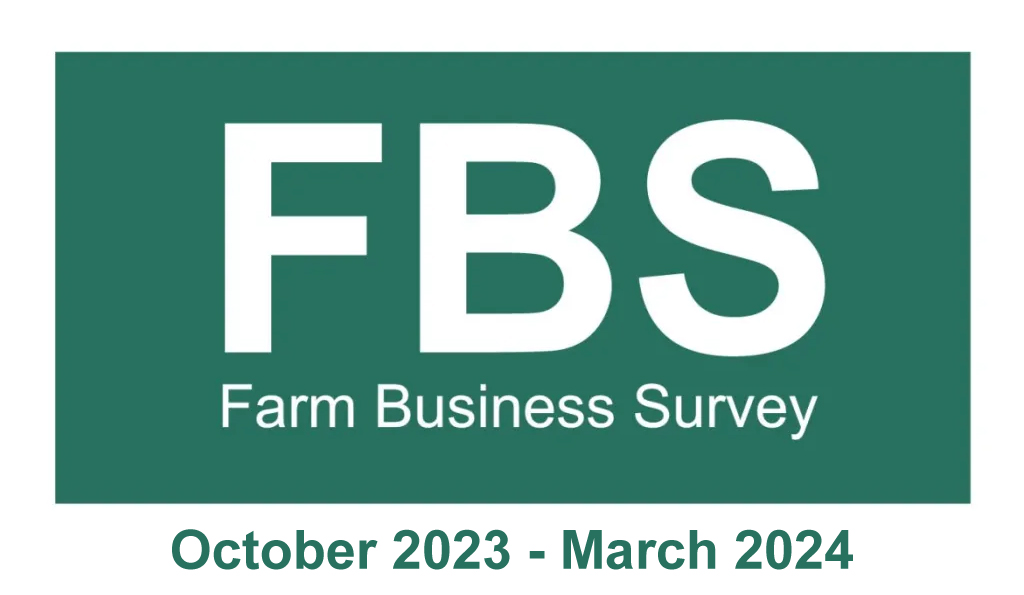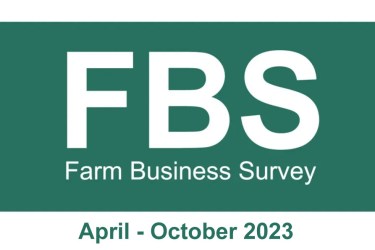This short report summarises key trends and challenges facing the agricultural industry based on conversations with farmers from October 2023 to March 2024. This information was gathered by our research officers, working on the Farm Business Survey (FBS).
The full report is available at the end of this summary. You can sign up to become part of the Farm Business Survey by clicking the buttons shown on this page.
Weather impacts
Prolonged rainfall necessitated extended livestock housing, leading to increased costs associated with depleted fodder and bedding.
Wet conditions significantly hampered autumn and spring planting, resulting in poor crop establishment or complete failures. Spraying and fertiliser application have also been limited.
Market fluctuations
Milk prices have seen a significant decrease compared to last year, placing pressure on margins when combined with rising electricity, feed, straw, and labour costs.
Beef prices are currently strong, but concerns remain regarding potential future feed cost increases due to reduced cereal planting in 2024.
Fat lamb prices have reached record highs. However, lambing rates have been negatively impacted by wet weather.
The pig and poultry sectors continue to experience producer departures due to high input costs and low returns, despite recent price increases for both products.
Labour and technology
Labour shortages remain a significant issue for horticultural holdings, with limited technological solutions available and current workforce supply insufficient. Rising minimum wage and fuel costs further exacerbate the challenges.
Sustainable Farming Incentives (SFIs)
Growing interest exists in SFIs due to declining BPS payments. However, the staggered rollout of program options is causing frustration, leading to application delays as farmers seek to choose the most suitable options. While a range of options are being adopted, limited to no options are currently available for horticulture, permanent grassland, and smaller farms with abundant environmental features.
Financial Concerns
Heavily capitalised businesses and those with high borrowings are facing increased financial pressure due to rising interest rates impacting cash flow.
While some input costs like spring seed, electricity, labour and straw have increased, others such as feed, fertiliser, silage wrap, and gas oil have seen a welcome decrease.
Generally, banks are becoming more cautious about lending. Oxbury Bank appears to have become the bank of choice for borrowing. Anecdotal evidence appears that certain big named banks have been closing farming accounts, especially those without borrowing facilities, confirming that they are no longer economic to maintain.
Many farms are adjusting their financial year-end to align with new basis periods, but uncertainty surrounds the impact of new tax regulations on the industry’s unique income pattern. Concerns exist regarding the potential mismatch between income received in one quarter and expenses incurred throughout the year.
Rumours of potential changes to inheritance tax rules for farms have instilled anxiety amongst farmers. Clarification from the government regarding the potential impact on farm succession is vital.
Regulation and compliance challenges
The implementation of new Veterinary Attestation rules in December 2023 has caused frustration at markets due to increased paperwork and delays.
Farms are experiencing heightened scrutiny from the Environment Agency, particularly regarding slurry and manure storage. Rigid spreading dates pose an additional hurdle, especially during wet periods when applying slurry can negatively impact soil health.
Biodiversity Net Gain (BNG) rules are causing confusion. Launched in January 2024, many farmers are still unclear about the details and implications of this new policy.
Carbon Footprints and Food Security
Farm carbon and methane emissions are receiving increased attention. Industry stakeholders emphasise the need for a standardised carbon footprint calculator encompassing all crops/plants and enterprises to ensure accurate and valuable data collection.
Concerns are mounting regarding food security, with significant areas of arable land remaining undrilled and land committed to environmental schemes, potentially reducing overall agricultural output.
Essential supplies issues
Farmers are reporting shortages of essential supplies. For example, Heptavac P and long-acting antibiotics are experiencing supply-chain issues in South East England, creating difficulties for livestock farmers.
Diversification continues – while some consider early retirement
Converting redundant buildings for alternative income sources remains a positive trend across the industry. Meanwhile agricultural land, particularly in the South East, faces intense competition from housing developers, leaving farmers with limited options for expansion.
Some farmers are contemplating early retirement as a way to manage workload pressures. Others are exploring ways to optimize SFI’s to reduce workload while maintaining income. However, many farmers have been delaying decisions until they have a clearer picture of future agricultural policies.
Food security concerns
The significant amount of land dedicated to environmental areas, coupled with the unutilized arable ground, has seen a rise in concern among farmers concerning the UK’s ability to meet future food security needs. A sense of discouragement lingers amongst farmers, who feel undervalued, and question the Conservative government’s prioritization of domestic food production.
Conclusion
Market uncertainty, volatile commodity prices, rising input costs, labour challenges, and extreme weather events created significant planning difficulties and increased stress levels within the agricultural industry.
The full Intelligence Report, shown below, aims to provide valuable insights for farmers as they navigate these complex challenges.
About Farm Business Survey
Defra’s Farm Business Survey (FBS) has been running for nearly 90 years. It provides data to government to help inform and evaluate policy, using evidence to bring changes that support the industry.
Promar runs FBS on behalf of Defra, as a ringfenced activity away from our commercial ventures. Our mission is to streamline the data collection and processing through a modernisation programme, reducing the burden on participants.
Ultimately, FBS is a project whose sole aim is to help farmers. We welcome the participation of all farms. If you are interested in taking part in FBS then please click this button to sign up.






